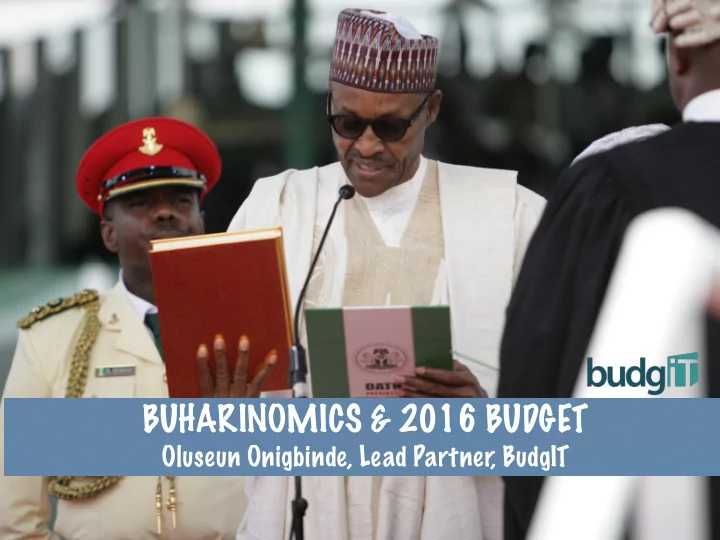

BUHARINOMICS & 2016 BUDGET Oluseun Onigbinde, Lead Partner, BudgIT
“ With depleted foreign reserves, falling oil prices, leakages and debts the Nigerian economy is in deep trouble and will require careful management to bring it round.. ” President M. Buhari May 29, 2015
Nigerian economy faces 7 major issues
Slowing economic 1 growth While it is agreed that Nigeria’s growth has not been inclusive cold data showed that growth has been slowing down 6.23% 2.84% Q3 2015 Q3 2014
Fast growing debt stock- relative to 2 government revenue Nigeria’s debt stock keeps rising and also the cost of servicing. Deficit hits a projected record high of N2.2tn Nigeria Debt Stock (NGN Millions) 35% 13000 9750 Nigeria’s debt service to revenue projected 6500 to reach 34% in 2016 3250 0 2010 Q1 2011 Q1 2012 Q1 2013 Q1 2014 Q1 2015 Q1
3 Inflation rising mildly Inflation is on a mild rise and already beyond CBN target band 9.6% 10 7.5 Inflation figure YoY as at December 2015; 5 currently at a 3-year high 2.5 0 Jan-13 May-13 Sep-13 Jan-14 May-14 Sep-14 Jan-15 May-15 Sep-15
Falling external reserves 4 The country’s external reserves dipped from $43.5bn (£30bn) in January 2014 to $28.3bn, a ten-year low. External Reserves (USD Billions) $ 27bn 60 53 Nigeria’s external 45 43.8 reserves need 42.8 42.3 $27bn to cover 34.2 32.6 32.3 six month imports 30 29.9 28.3 15 0 2008 2009 2010 2011 2012 2013 2014 2015 2016
5 Falling government revenue Oil contribution to matrix slows down - N1. 1 tn Gross Monthly FAAC (NGN millions) 1200 With oil prices tumbling, Nigeria’s revenue 900 has taken hit on every angle. As at September 2015 , FG 600 Retained earnings still had a N1.12tn gap. 300 0 Jan-10 Oct-10 Jul-11 Apr-12 Jan-13 Oct-13 Jul-14 Apr-15
6 Collapse in Asset Class Nigeria’s stock market has been facing decline since the Buhari bounce in early April 2015 signifying capital flight from portfolio investors “Nigeria lost N1.2tn in the first eight trading days in 2016. The -N1.2tn third largest exchange loss in the world after China and Saudi Arabia” The Cable NG
7 Competitiveness The Nigerian economy despite the incentives for local market investment 124 faces acute inability to compete globally. Despite liquidity in the domestic market, asset creation at the private sector is not rising fast. Nigeria economy is not NIGERIA’S COMPETITIVENESS still competitive enough. RANKINGS
the Proposed 2016 Budget What is the Policy Direction of the Nigerian Government ?
The current Nigerian government seems to be in a hurry to expand debt, unwilling to apply austerity, diversify revenues & also has interest in social intervention programmes
Buharinomics so far N500bn social Intervention Fund Unwilling to remove fuel Loot Recovery subsidies Not ready to devalue the currency The Treasury Single Account with N2tn balance Setting up Efficiency Unit Propose record deficit at N2.2tn Improved Transparency at NNPC N600bn capital fund for Works, Power, Housing & Transport Diversification - firm leadership at FIRS, Customs & Solid Minerals Raise liquidity for banking sector-specific investments
2016 Budget: Is the “ungolden” era of oil over? This 2016 budget is not based on oil. Oil related revenue accounts for 13% of proposed FG Budget Expenditure
How will 2016 Budget be funded? FG sh are of oil related revenue projection tumbles from N1.64tn in 2015 N3.86tn to N820bn in 2016 N1.64tn Oil N820bn N1.45tn Non-oil N820bn Independent Revenue N1.5tn
How feasible is Revenue? Oil Price keeps tumbling Independent Revenue down per barrel and how N1.5tn feasible is 2.2m barrels per day? $38 Independent Revenue presents the biggest $28 opportunity due to efficiency driven by the Treasury Single Account FX policy is hurting non-oil export as Customs revenue N977bn dips from N977bn in 2014 to N903bn in 2015
The Staggering Deficit N2.2tn The Deficit, which is equivalent to 2.16% of Nigeria’s GDP or 36.51% of total government 2016 spending plan 2016 N2.2tn 2015 N1.04tn
Expenditure N6.08tn Capital Recurrent Expenditure Expenditure 70% 30%
The N6.08tn Expenditure STATUTORY N351.37bn TRANSFERS TOTAL DEBT N1.475tn SERVICE MDAs N1.87tn RECURRENT MDAs N1.23tn CAPITAL OTHER N370bn CAPITAL OTHER RECURRENT N775bn
The N6.08tn Expenditure KEY MINISTERIAL ALLOCATIONS Social Spending of N500bn is the highest component in the budget. However, the “Super” Ministry of Works, Power & Housing got huge share of the budget. Education and Health budgets are huge but are mainly for personnel costs - doctors & teachers
The N6.08tn Expenditure KEY CAPITAL ALLOCATIONS Key capital allocations jumps are for Works and Housing, Transport, Defence and Interior. Capital allocations to social sectors such as education & health did not rise, showing government lack of concern to boost infrastructure in such sectors.
N257bn Health Budget in 2016 90% for Recurrent Budget 4.2% of the Budget
Where is the 1% of CRF for the National Health Act?
How is the 1% of CRF for the National Health Act mean to be spent ? The National Health Care Development Agency which will manage 45% of the fund, to be disbursed through each state and the FCT Primary Health Care Development Board for the provision of essential drugs, vaccines and consummates. The National Health Insurance Scheme which will manage 50% of the fund for the of basic minimum package of health facilities The Federal Ministry of Health will manage 5% of the fund for the provision of basic minimum package of health facilities.
The N6.08tn Expenditure 2016 KEY BUDGET PRIORITIES & OPPORTUNITIES 1. Buying Government Bonds with domestic offering put at N984bn 6. Computers & Software Acquisitions 2. Railway Sector to see Every Ministry still wants to buy N90bn investment software and computers. Total proposed spending at N22bn 3. Inland Waterways proposed spending up to N50bn 7 . N500bn The Federal Government to 4. Housing embark on massive social spending 7 ,068 Units stated in the budget including school feeding programs up to N44.5bn 8. N167bn 5. Roads Defence Infrastructure with Massive expansion on roads to gulp huge capital spending at NSA & Defence N224bn Ministry.
THANK YOU
Recommend
More recommend